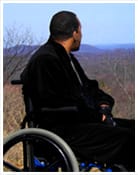Proving Fault In Slip And Fall Claims
A claim for injury due to a slip and fall accident is a tort action in the United States. Generally, an individual suffers harm due to slipping and falling while on another’s property. The property may be public or private property, although most slip and fall claims are based on accidents that occurred on private property (such as a business). The person at fault, or liable for the accident, may be the owner of the property where the accident occurred. The injured party filing a claim will usually be seeking monetary damages for injuries sustained due to the slip and fall.
Proving A Slip And Fall Claim
A plaintiff must prove four elements to prevail in a slip and fall case. The elements are the same for any tort, and are duty, breach of duty, causation and injury. The defendant (usually the property owner) must have a legal duty to prevent injury to the victim. The court will generally hold the defendant to the standard of what a reasonable person would have done under the same circumstances, There is a legal duty to prevent predictable harm to another individual. Once a duty is established, the plaintiff must show that the duty was breached, meaning the defendant violated his or her legal obligation to ensure the safety of the plaintiff. Next, causation must be shown; that the defendant’s breach of duty caused the plaintiff’s injury. The defendant (property owner) does not have to directly cause the plaintiff’s injury by committing an action to be held liable. If a defendant’s inaction or failure to create a safe environment caused the injury, the defendant can also be held responsible. Lastly, the plaintiff must prove to the court that an injury occurred. In the case of a slip and fall, the injury will be physical in nature.
Property Owner Defenses
Generally, a property owner will have one of two defenses; lack of negligence or fault of the injured party. The most common location that a slip and fall occurs is in a place of business. In these cases, a property owner may try to prove that he or she exercised reasonable care in keeping his or her property safe for customers. Business/property owners are required to exercise due diligence in making their property safe for all persons that may enter it. This includes detecting any hazardous conditions that may be present and making sure they are resolved and do not cause harm to patrons. Property owners may show that the cause of the injury was outside of their control. For example, the injured person slipped on liquid that had just been spilled by another customer.
Likewise, the property owner may claim that the injury was caused by the injured party. Individuals are required to exercise due care to avoid injuring themselves. If they do not exercise care, others cannot be held accountable for their own negligence. An example may be if the injured party saw the other patron spill liquid on the floor and then stepped directly in the liquid instead of waiting for it to be cleaned up or walking around it.

